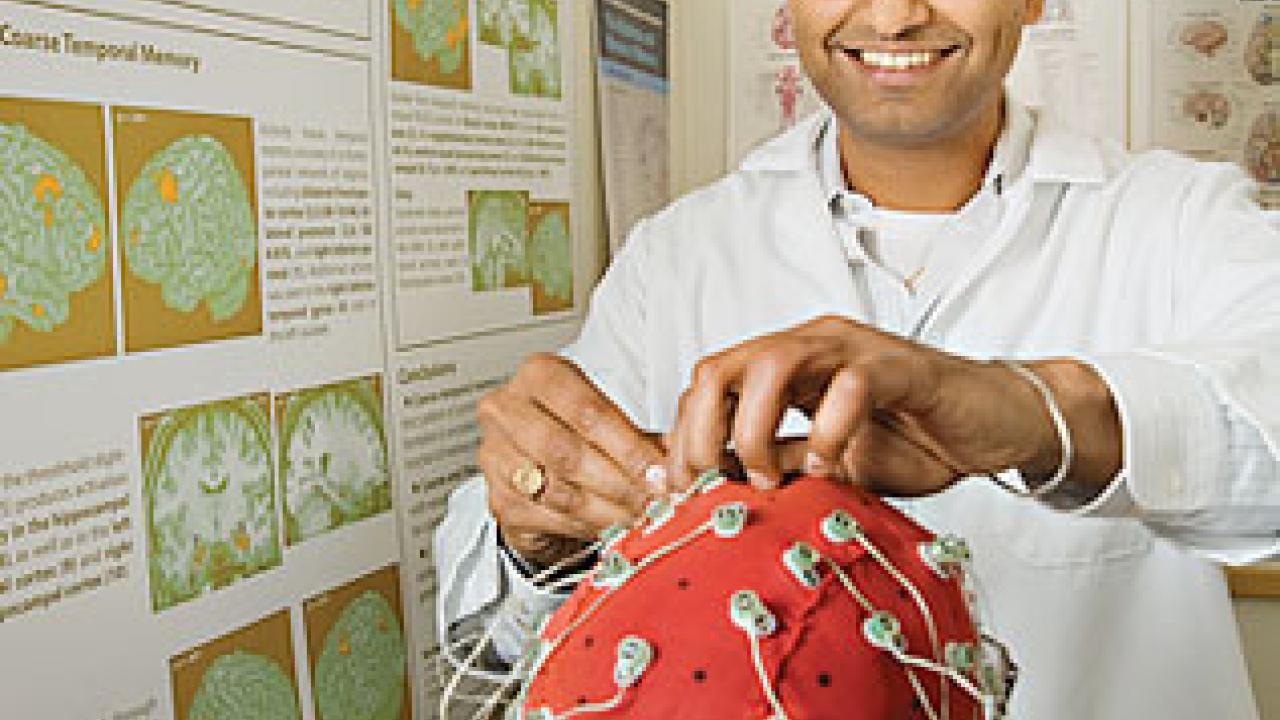Charan Ranganath got into memory research to help people with brain damage due to Alzheimer's disease, trauma or other causes. That work has now earned Ranganath, a professor in the Department of Psychology and Center for Neuroscience at the University of California, Davis, a $40,000 fellowship from the John Simon Guggenheim Memorial Foundation, one of 175 awarded to scientists, artists and scholars by the foundation this year.
Ranganath will use his fellowship for a sabbatical at the University of Cambridge, England, where he will work with researchers in the psychology department and in the Medical Research Council Cognition and Brain Sciences Unit. He will also work on a book about human memory for the general public. Ranganath's sabbatical will also be supported through a visiting professorship from the Leverhulme Trust, London.
"I am delighted that Professor Ranganath has been honored with a Guggenheim Fellowship. He is an exceptionally talented scholar, a key member of our renowned UC Davis memory group, and a popular teacher in psychology, the campus's largest major," said Ron Mangun, dean of social sciences at UC Davis.
Mangun hailed Ranganath's laboratory as an "excellent example" of cooperation between schools and colleges in neuroscience at UC Davis.
During his training as a clinical psychologist at Northwestern University in the mid-1990s, Ranganath began to wonder if memory tests could be improved.
"I was testing a lot of people with brain damage, and I felt that if we knew more about how the brain worked, we could do better with our tests," he said.
A memory function test developed by Ranganath and colleagues at UC Davis was recently assessed in a large study of schizophrenia patients as part of the Cognitive Neuroscience Test Reliability and Clinical Applications for Schizophrenia (CNTRACS) Consortium. The consortium includes five research sites: UC Davis; Maryland Psychiatric Research Center at the University of Maryland; University of Medicine and Dentistry of New Jersey; University of Minnesota - Twin Cities; and Washington University in St Louis.
"Now we're going back into the clinic with trials of new measures based on new knowledge, so it has moved full circle," he said.
At Northwestern, Ranganath conducted research on the role of the prefrontal cortex in memory retrieval, working in the then-new laboratory of Northwestern Professor Ken Paller. After a clinical internship at the Chicago Westside VA hospital in 1999, Ranganath opted for a research career, carrying out postdoctoral work with Professor Mark D’Esposito, then at the University of Pennsylvania School of Medicine, and helping to set up the Brain Imaging Center at UC Berkeley. He joined the faculty at UC Davis in 2002.
Ranganath believes that the evolutionary function of memory is to help us use past experience to guide future decisions and actions. Currently, he is working on the hypothesis that there are two distinct memory systems that allow us to do this. One of these, the anterior temporal system, may allow us to evaluate the significance of particular people and things — to answer “who” and “what” questions, such as: "Is this plant poisonous?" or "Is this person trustworthy?"
The other network, the posterior medial system, may allow us to plan our actions based on particular situations and contexts — "where," "when," and "why" questions, such as: "Where is the nearest restaurant?" or "Why is my friend is crying at a wedding?"
These two networks are directly relevant to clinical neurology, Ranganath said. Different diseases target different areas of the brain, and this could explain, for example, why people with some forms of dementia first lose the ability to recall detailed knowledge of people and things, while others first lose memory for recent events.
UC Davis is a major center for brain research, with three overlapping centers that bring together researchers from the School of Medicine, College of Biological Sciences, College of Letters and Science and others. The UC Davis Center for Neuroscience, established in 1990, investigates brain structure, memory, and the genes and molecules involved in conditions such as schizophrenia and depression. Founded in 2002, the Center for Mind and Brain at UC Davis studies cognition, vision, language, meditation and music. The MIND Institute at UC Davis was founded in 1998 with the support of six Sacramento-area families. The MIND Institute works with autistic children and their families, as well as on fragile X syndrome, Tourette's syndrome and other neurodevelopmental disorders.
Media Resources
Andy Fell, Research news (emphasis: biological and physical sciences, and engineering), 530-752-4533, ahfell@ucdavis.edu
Charan Ranganath, Center for Neuroscience, 530-757-8750, cranganath@ucdavis.edu
